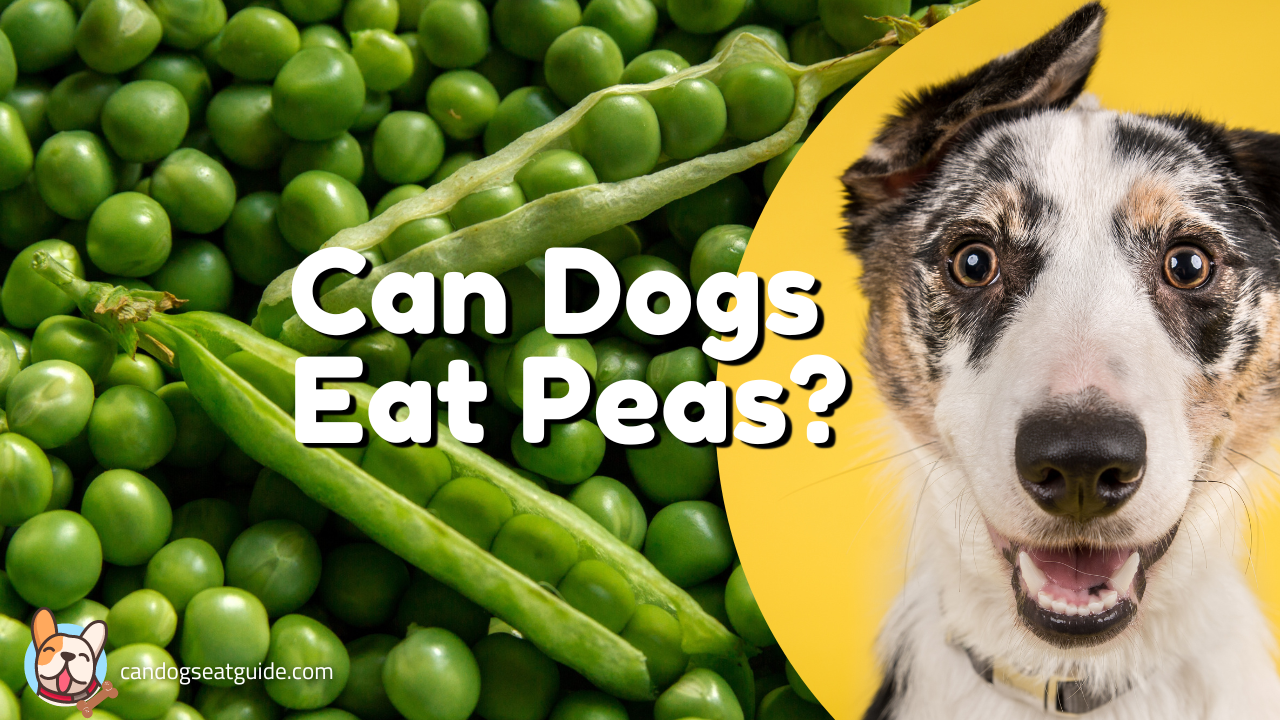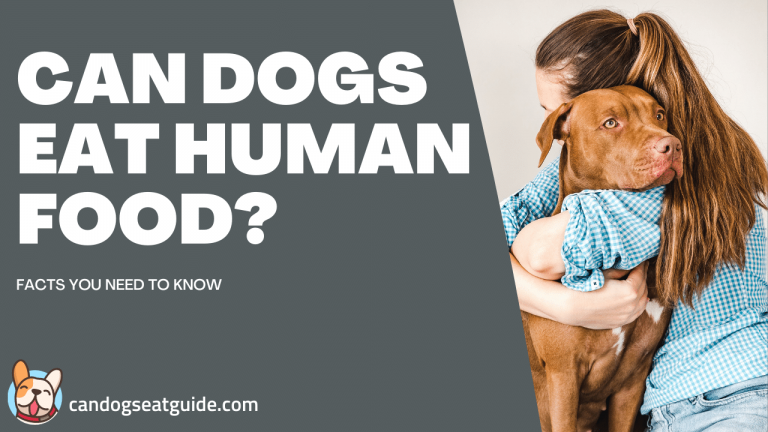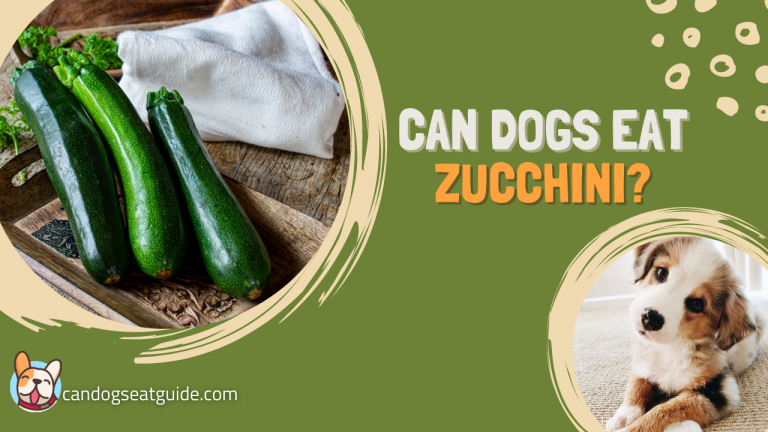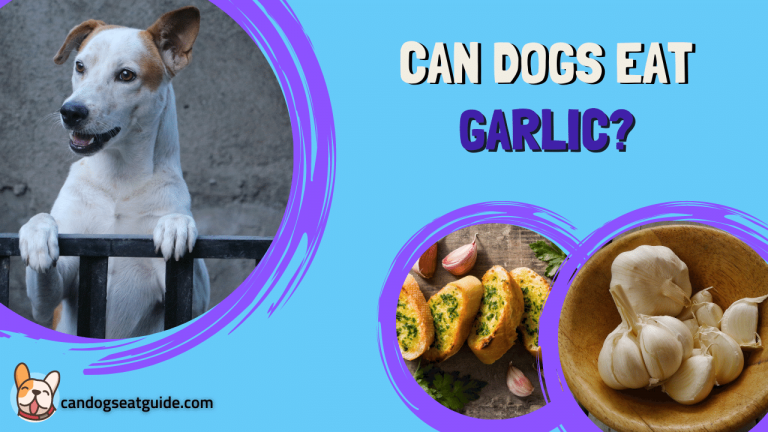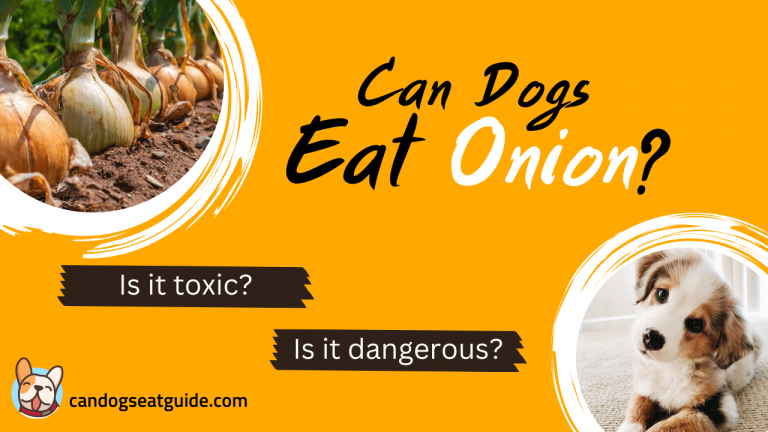Can Dogs Eat Peas?
Yes, dogs can eat plain peas in moderation.
In fact, peas are a common ingredient in many commercial foods as they are high in proteins and low in calories, making them a wholesome snack for your dog.
Being a dog lover, you might be worried about which type of peas you should feed your dog or whatever questions you have in your mind.
Which type of peas? How much? These and many other FAQs are answered below.
Can Dogs Eat Peas?
We all know that peas are a great and healthy snack for humans, but can dogs eat peas or not?
Yes, dogs can eat peas as they are a good source of protein and dietary fiber.
Peas contain vitamins A, B, C, and K and are also rich in essential nutrients like manganese, thiamin, and folate. Peas can serve as excellent treats or meal toppers and most dogs love them.
What Kind of Peas Can Dogs Eat?
There are a lot of peas out there, from chickpeas and canned peas to black peas and snap peas. So, before giving peas to your pet you should know which type of pea dogs can eat and which you should keep away from them.
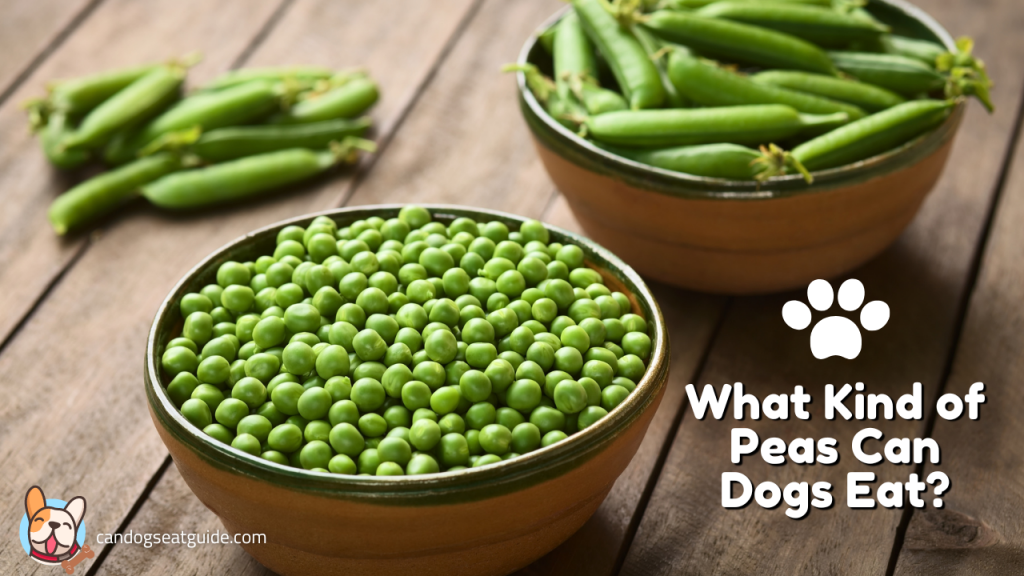
Canned Peas
Canned peas are not a healthy option for your dog as they contain a high level of sodium and salts. You can search your local grocery store for options with no added salts if you want to give your dog canned peas.
Frozen Peas
You can give frozen peas to your dog as they are safe for your dog. But avoid frozen peas with butter, sauces, or added sodium.
Snap Peas
Snap peas are a good source of carbohydrates, proteins, fiber, minerals, and vitamins. But some studies also show that snap peas can cause heart disease in dogs. So, it’s better to look out for another pea variety.
Black-Eyed Peas
You can serve your dog with black-eyed peas as they are a source of proteins, fiber, and carbohydrates and also contains vitamins that are beneficial for your pup.
Chickpeas
Chickpeas can prove as a potential source of carbohydrates and proteins for dogs that have allergies to more common sources of proteins and carbohydrates. But overfeeding chickpeas can cause canine dilated cardiomyopathy in your dog.
Pea Pods
Pea pods are low-calorie snacks for pups struggling with weight problems. So, these can be given to the dog as treat.
Health Benefits of Peas For Dogs
Some of the health benefits of peas for your dog are:
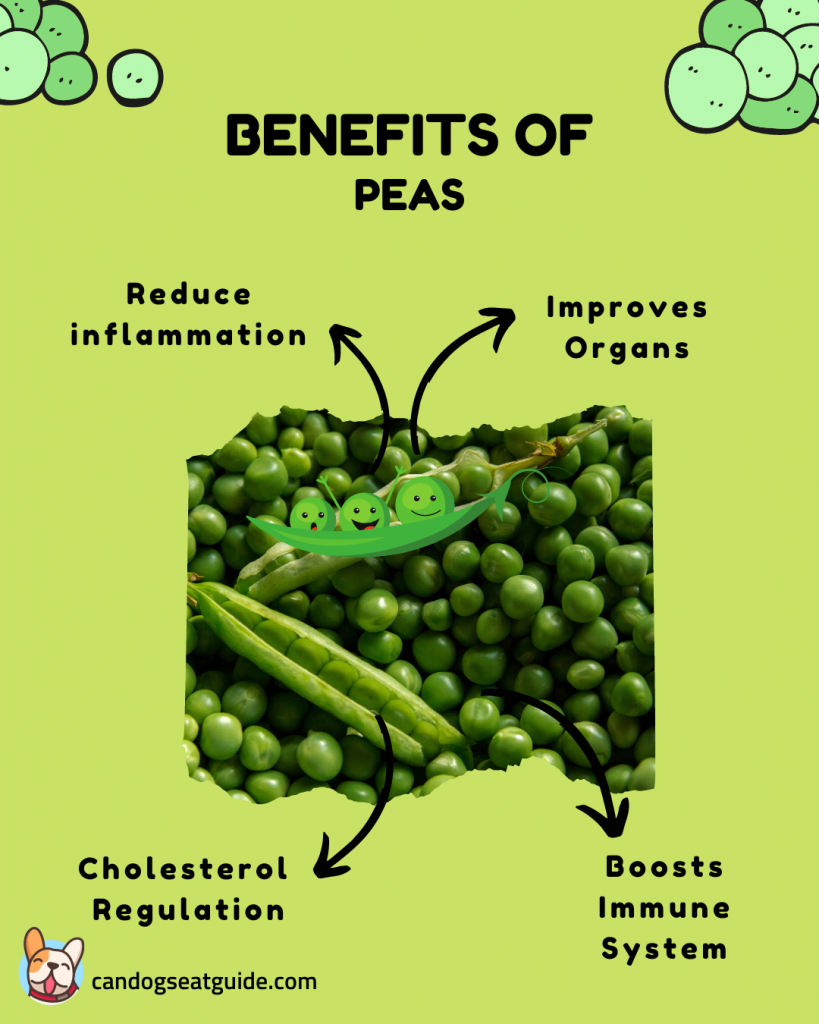
- Boosts immune system: Peas contain Vitamins A, C, and K that help to boost your pet’s immune system. It also helps to improve the quality of the skin and helps with inflammation.
- Cholesterol Regulation: Peas contain high fiber that helps to maintain weight, lowers cholesterol, and also improves digestion. Carbohydrates present in peas also provide energy to dogs. Fiber is needed for dogs to prevent diarrhea and constipation.
- Improves organs: Lutein in peas supports skin, eyes, and heart health in your pet. Linoleic acid helps to maintain fur and healthy skin.
Nutritional Facts of Peas
Let’s see some nutritional facts about Peas.
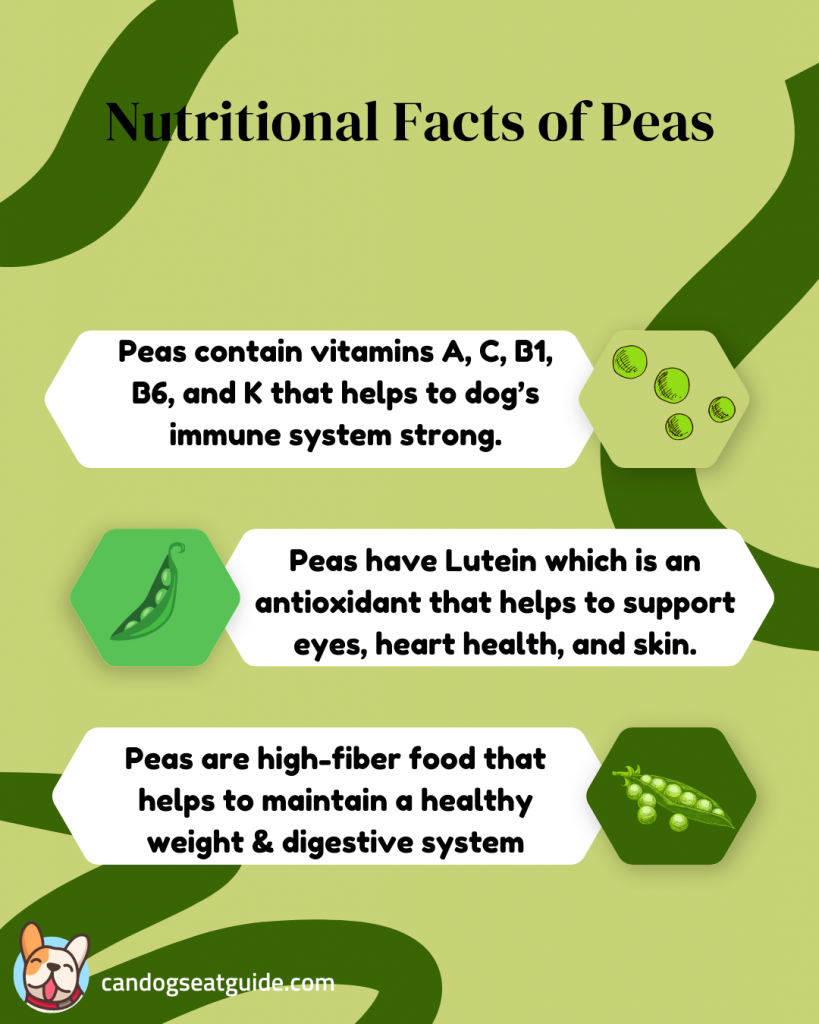
- Vitamins: Peas contain vitamins A, C, B1, B6, and K. They help to keep your dog’s immune system strong. It also promotes healthy skin, nerves, muscles, and eyes.
- Antioxidants: Peas have Lutein which is an antioxidant that helps to support eyes, heart health, and skin. A common fatty acid linoleic acid also helps with fur and healthy skin.
- Carbohydrates and fiber: Peas are high-fiber food that helps to maintain a healthy weight, promote the digestive system, and lower cholesterol while carbohydrates provide energy.
- Minerals: Some minerals in peas that are effective for bone growth and make the body work more efficiently are calcium, phosphorous, and magnesium.
Homemade Peas Dog Treats
Let’s have a look at homemade Peas dog treats that are the perfect treats for your pup.
Green Pea Dog Cookies

Ingredients:
Procedure:
- In a food processor, pulse together all the ingredients.
- Make cookie dough balls and place them on a baking tray lined with a baking sheet.
- Now, bake for 15 to 20 minutes until turned lightly brown.
- Take them out of the oven and leave them for 15 minutes to cool.
- You can store the cookies in the refrigerator for three days.
Peas and Rice Dog Treat
Ingredients:
- 3 pounds of ground turkey;
- 2 shredded carrots;
- 1 shredded zucchini;
- 1 cup brown rice;
- 1 tbsp olive oil;
- 1/2 cup fresh peas;
- 3 cups baby spinach.
Procedure:
- Cook rice by adding three cups of water in a saucepan.
- In a large pot, heat olive oil and add turkey, and cook until it turns brown.
- Make sure to crumble the turkey as it cooks.
- Now, add spinach, carrots, zucchini, peas, and brown rice for about five minutes.
- Let cool completely and serve.
Instant Stew Dog Treat
Ingredients:
- 1 pound beef stew meat;
- 3/4 pound baby potatoes;
- 2 large carrots;
- 2 large celery stalks;
- 4 tbsp all-purpose flour;
- 1 cup frozen peas;
- 4 cups of no-salt beef broth.
Procedure:
- Cut beef into small pieces and saute until evenly browned.
- Dice potatoes, carrots, and celery into 1/2-inch pieces.
- Add four cups of beef broth, sauteed beef, and vegetables to the instant pot. Close and lock the lid, adjust the pressure to high, and set the time for 30 minutes.
- Now, whisk together the remaining broth and flour and add it to the stew.
- Stir in peas until heated through for about 1 minute.
- Turn off the instant pot and put the stew in the bowl.
- Cool before serving.
Things You Should Care About Before Feeding Peas To Your Dog
You should take care of these things before feeding peas to your dog.
- Kidney Problems: If your dog has kidney problems, avoid feeding them peas. Peas contain purines, a chemical compound that produces uric acid. Uric acid can cause kidney stones and other conditions in your dog.
- Choking Hazard: Always feed your dog shelled, little round peas which are easier to swallow otherwise pea pods can be a choking hazard for your dog.
How To Feed Peas To Dogs?
After getting an answer to “Can Dogs Eat Peas“? Now, the concern is how to feed peas to dogs.
Feed peas in moderation: You should always feed peas in moderation to your dog. Feeding too many peas can create problems for your dog like diarrhea and gas, so feed sparingly.
Feed plain peas: You might love peas with a pat of butter and some seasoning but when it comes to giving them to your dog, it’s better to skip adding flavors. So, make sure to feed plain peas to your dog.
Don’t feed canned peas: You should not feed your dog canned peas as it contains a high level of sodium or preservatives. Instead of canned peas, you can give fresh, frozen, or steamed peas to your dog.
Facts About Peas
- Peas contain Vitamin C, folate, protein, carbohydrates, and fiber.
- 100 hundred calories serving of peas contain more proteins than a whole egg.
- Foods low in sodium are really good for your heart. Half a cup of peas has only 5% of the daily limit of sodium.
- Less vitamin C is lost if you put less water in cooking it.
- On average everyone in Britain eats 9,000 peas per year.
FAQ’s
Can dogs eat peas?
Yes, dogs can eat peas if given in moderation.
Can dogs eat hummus?
No, dogs can not eat hummus. Although hummus is made from chickpeas it contains lots of garlic and other spices which are not for the dog.
Can dogs eat snow peas?
Yes, dogs can eat snow peas. But to avoid potential choking hazards, it’s best to shell them.
We hope you like the article ‘Can Dogs Eat Peas’. You can also check out our other articles to see which vegetables you can easily feed your dog.
Can Dogs Have Sweet Potatoes? Best Fed In Moderation

